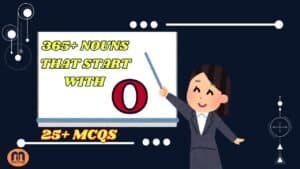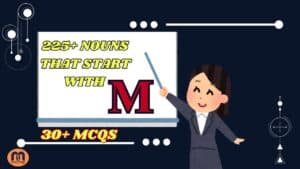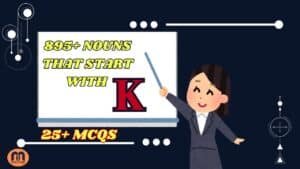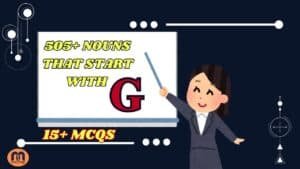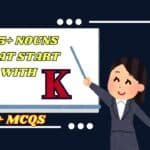Verbs That Start With C: Verbs are the backbone of any language, driving sentences forward and enabling us to express actions, states, or occurrences.
But how often do we take time to expand our vocabulary and explore the variety of verbs available to us? Whether you’re writing, speaking, or simply trying to improve your communication skills, knowing a broad array of verbs can make all the difference.
In this article, we will explore over 564+ verbs that start with the letter C, providing you with practical insights on how to use them effectively in everyday situations.
From the most common to the more obscure, these verbs will enrich your vocabulary and enable you to convey more precise and vibrant expressions.
The Power of Verbs: Why They Matter
Verbs are essential in every sentence, helping us convey action, emotions, and conditions. From a simple “I eat” to the more complex “She contemplates the future,” verbs create the structure and flow of our speech and writing.
Having a wide range of verbs in your arsenal allows you to:
- Communicate more clearly: The right verb adds nuance, showing exactly what you mean.
- Enhance creativity: Different verbs can evoke different feelings or imagery, making your writing or speaking more engaging.
- Be more persuasive: Strong, decisive verbs can make your statements more convincing.
The letter C is especially rich with dynamic verbs that can serve all these purposes. Let’s break them down into manageable categories to help you navigate them easily.
Common Verbs Starting with C
Common verbs starting with C are frequently used in everyday communication. These verbs are essential for building clear and concise sentences. They serve as the foundation for simple and effective expression.
- Call
- Catch
- Carry
- Choose
- Create
- Come
- Climb
- Consider
- Clean
- Count
- Continue
- Confirm
- Conclude
- Cut
- Compare
- Change
- Cancel
- Connect
- Conserve
- Cause
- Capture
- Celebrate
- Convert
- Criticize
- Convey
- Cough
- Clap
- Construct
- Cling
- Crush
- Curse
- Clash
- Clinch
- Clear
- Check
- Clutch
- Climb
- Contract
- Care
- Consult
- Clinch
- Calculate
- Compete
- Compel
- Count
- Critique
- Condense
- Compare
- Commence
- Cure
- Chase
- Cough
- Celebrate
Action-Oriented Verbs Starting with C
Action verbs starting with C convey dynamic actions and help describe movement or activity. These verbs add energy and motion to your sentences, encouraging engagement and forward-thinking.
- Climb
- Carry
- Catch
- Chase
- Crawl
- Crush
- Crack
- Cut
- Crawl
- Capture
- Cave
- Create
- Clutch
- Crash
- Climb
- Compete
- Clash
- Cajole
- Cure
- Collide
- Collaborate
- Crave
- Cajole
- Conquer
- Carve
- Cast
- Conclude
- Crawl
- Charge
- Chase
- Convert
- Communicate
- Churn
- Cuddle
- Crawl
- Clamor
- Cork
- Cultivate
- Convey
- Calibrate
- Cut
- Compensate
- Capitalize
- Coordinate
- Churn
- Cram
- Cauterize
Verbs Related to Thinking and Communication
Verbs associated with thinking and communication help convey ideas, thoughts, and understanding. These verbs are vital for expressing knowledge, sharing information, or engaging in meaningful discussions.
- Consider
- Consult
- Clarify
- Convince
- Contemplate
- Communicate
- Conclude
- Comprehend
- Create
- Connect
- Convey
- Censor
- Challenge
- Coordinate
- Comment
- Critique
- Collaborate
- Confess
- Contemplate
- Cajole
- Converse
- Consult
- Censor
- Compare
- Claim
- Clarify
- Condone
- Confront
- Compose
- Confide
- Compile
- Concur
- Coerce
- Counsel
- Claim
- Categorize
- Confuse
- Convince
- Constrain
- Chide
- Contend
- Clarify
- Collaborate
- Capture
- Consult
- Converse
- Cajole
Verbs Expressing Change and Transformation
Verbs of change and transformation help describe processes that involve shifts or alterations in state. They are essential in storytelling, problem-solving, and reporting changes in situations.
- Change
- Convert
- Cure
- Create
- Cultivate
- Crumble
- Clarify
- Cut
- Collapse
- Converge
- Compress
- Consolidate
- Crumple
- Clinch
- Contradict
- Change
- Crack
- Cancel
- Color
- Cure
- Conquer
- Condition
- Clarify
- Compensate
- Compile
- Cavort
- Convert
- Cage
- Clench
- Coerce
- Clone
- Coalesce
- Clarify
- Chisel
- Cram
- Compact
- Cloak
- Cushion
- Check
- Cement
- Crystallize
- Cave
- Cascade
- Control
Verbs for Emotional Expression and Interaction
Verbs that express emotions and interactions are integral to personal communication. These verbs help convey feelings and describe how we engage with others in emotional and personal ways.
- Comfort
- Cherish
- Cry
- Cuddle
- Challenge
- Chide
- Clash
- Confront
- Console
- Confess
- Complain
- Celebrate
- Contemplate
- Convince
- Confide
- Condescend
- Cajole
- Chide
- Cling
- Conflate
- Compel
- Condone
- Contend
- Crave
- Curse
- Call
- Cajole
- Comfort
- Chase
- Cry
- Cuddle
- Contribute
- Cower
- Consult
- Crown
- Celebrate
- Condemn
- Call
- Champion
- Concede
Verbs for Movement and Travel
These verbs focus on physical movement and travel, describing how one moves through space. They are useful for both literal and metaphorical journeys, making them versatile in various contexts.
- Climb
- Carry
- Chase
- Cruise
- Crawl
- Crawl
- Cross
- Creep
- Camp
- Charge
- Climb
- Catch
- Cruise
- Cavort
- Crawl
- Change
- Contort
- Crawl
- Capture
- Clutch
- Cruise
- Circumnavigate
- Cycle
- Cling
- Carry
- Cater
- Crawl
- Climb
- Change
- Cavort
- Convey
- Crawl
- Compact
- Cure
- Carry
Descriptive Verbs Starting with C
Descriptive verbs paint vivid pictures of actions or states, adding color and detail to sentences. These verbs enhance the reader’s or listener’s experience by making the language more dynamic and expressive.
- Chase
- Climb
- Creep
- Cuddle
- Chisel
- Chime
- Chomp
- Crumble
- Clash
- Clinch
- Cajole
- Crack
- Crawl
- Capture
- Cavort
- Crumple
- Cling
- Cackle
- Crumble
- Crouch
- Clinch
- Claw
- Crunch
- Clobber
- Churn
- Chuckle
- Chisel
- Crinkle
- Cower
- Chirp
- Chomp
- Crawl
- Cloak
- Crunch
- Cry
- Chime
- Clutch
- Create
- Chime
- Chase
Uncommon but Useful Verbs Starting with C
These less commonly used verbs add depth and nuance to your language. While not frequently encountered, they can enrich your vocabulary and make your communication more sophisticated.
- Cajole
- Cavort
- Chasten
- Clamor
- Chide
- Clinch
- Cower
- Chisel
- Cavort
- Cajole
- Canker
- Condone
- Comprehend
- Cloak
- Chuckle
- Chomp
- Coerce
- Concur
- Chastise
- Cling
- Cajole
- Crown
- Condescend
- Captivate
- Cavort
- Cement
- Clasp
- Cower
- Convalesce
- Chime
- Clinch
- Cower
- Cram
- Cater
- Cannon
Catchy C-Verbs
Catchy C-verbs are essential for making your speech or writing stand out. These verbs are used in everyday communication to express a variety of actions and emotions. They are vibrant, memorable, and can give your sentences more impact.
- Call
- Catch
- Carry
- Choose
- Create
- Come
- Climb
- Consider
- Clean
- Count
- Continue
- Confirm
- Conclude
- Cut
- Compare
- Change
- Cancel
- Connect
- Conserve
- Cause
- Capture
- Celebrate
- Convert
- Criticize
- Convey
- Cough
- Clap
- Construct
- Cling
- Crush
- Clash
- Clinch
- Clear
- Check
- Clutch
- Climb
- Contract
- Care
- Consult
- Clinch
- Calculate
- Compete
- Compel
- Count
- Critique
- Condense
- Compare
- Commence
- Cure
- Chase
- Cough
- Celebrate
Action with C
Action verbs starting with C bring movement and dynamism to any conversation or writing. These verbs describe a range of physical activities and help convey a sense of urgency or excitement. They encourage action and get things done.
- Climb
- Carry
- Catch
- Chase
- Crawl
- Crush
- Crack
- Cut
- Crawl
- Capture
- Cave
- Create
- Clutch
- Crash
- Climb
- Compete
- Clash
- Cajole
- Cure
- Collide
- Collaborate
- Crave
- Cajole
- Conquer
- Carve
- Cast
- Conclude
- Crawl
- Charge
- Chase
- Convert
- Communicate
- Churn
- Cuddle
- Crawl
- Clamor
- Cork
- Cultivate
- Convey
- Calibrate
- Cut
- Compensate
- Capitalize
- Coordinate
- Churn
- Cram
- Cauterize
Think and Speak with C
These C-verbs are perfect for intellectual and communicative tasks. They help you express thoughts, share information, and engage in discussions. Use them to clarify, convince, and collaborate more effectively.
- Consider
- Consult
- Clarify
- Convince
- Contemplate
- Communicate
- Conclude
- Comprehend
- Create
- Connect
- Convey
- Censor
- Challenge
- Coordinate
- Comment
- Critique
- Collaborate
- Confess
- Contemplate
- Cajole
- Converse
- Consult
- Censor
- Compare
- Claim
- Clarify
- Condone
- Confront
- Compose
- Confide
- Compile
- Concur
- Coerce
- Counsel
- Claim
- Categorize
- Confuse
- Convince
- Constrain
- Contend
- Clarify
- Collaborate
- Capture
- Consult
- Converse
- Cajole
Change and Grow with C
Verbs related to change and growth describe the transformation of ideas, people, and situations. These verbs symbolize personal growth, the evolution of circumstances, and the reshaping of the world around us.
- Change
- Convert
- Cure
- Create
- Cultivate
- Crumble
- Clarify
- Cut
- Collapse
- Converge
- Compress
- Consolidate
- Crumple
- Clinch
- Contradict
- Change
- Crack
- Cancel
- Color
- Cure
- Conquer
- Condition
- Clarify
- Compensate
- Compile
- Cavort
- Convert
- Cage
- Clench
- Coerce
- Clone
- Coalesce
- Clarify
- Chisel
- Cram
- Compact
- Cloak
- Cushion
- Check
- Cement
- Crystallize
- Cave
- Cascade
- Control
Conclusion: Verbs That Start With C
Incorporating a broader range of verbs into your vocabulary can truly elevate your communication. Whether you’re trying to sound more confident, creative, or persuasive, knowing how and when to use the right verb is crucial.
From common verbs to those that are more niche, understanding their meanings and applications allows you to add depth to your speech and writing.
By practicing with verbs like climb, conquer, and create, you can enhance your ability to express action, convey emotions, and even transform your world.
Now that you’ve explored over 564+ verbs starting with C, take time to experiment with them in your own writing and conversation. How many of these verbs can you use today? What new verb can you introduce to your vocabulary?
Keep experimenting, and you’ll find that your communication will become more dynamic and engaging in no time!
MCQs: Verbs That Start With C
1. Which of the following verbs is most commonly used to describe physical movement?
a) Consider
b) Climb
c) Communicate
d) Compare
Answer:
b) Climb
2. What is the main purpose of “C-verbs” in communication?
a) To convey deep emotions
b) To describe action and transformation
c) To make sentences longer
d) To confuse the reader
Answer:
b) To describe action and transformation
3. Which verb is used for thinking and sharing ideas?
a) Cuddle
b) Chase
c) Consult
d) Clutch
Answer:
c) Consult
4. Which of the following verbs means to physically move towards something?
a) Compare
b) Capture
c) Churn
d) Crawl
Answer:
d) Crawl
5. Which verb is associated with personal growth or change?
a) Celebrate
b) Create
c) Convert
d) Climb
Answer:
c) Convert
6. What is the role of “C-verbs” in describing emotions?
a) They are used to confuse others.
b) They help express feelings and personal interactions.
c) They only describe physical movement.
d) They make the conversation less interesting.
Answer:
b) They help express feelings and personal interactions.
7. Which verb would you use to describe an action where two things meet forcefully?
a) Collaborate
b) Collapse
c) Collide
d) Clarify
Answer:
c) Collide
8. Which verb would be used to describe a process of changing or improving something?
a) Cancel
b) Conquer
c) Cultivate
d) Cling
Answer:
c) Cultivate
9. Which of these verbs best describes a transformation or reformation of something?
a) Censor
b) Create
c) Critique
d) Cower
Answer:
b) Create
10. Which of the following verbs is most commonly used when dealing with intellectual discussions?
a) Capture
b) Chisel
c) Communicate
d) Cuddle
Answer:
c) Communicate
11. What is the primary focus of “Action with C” verbs?
a) Describing emotions
b) Describing physical activities and movement
c) Describing thought processes
d) Describing interactions
Answer:
b) Describing physical activities and movement
12. Which of these verbs describes a situation where something is completely broken down or ruined?
a) Cuddle
b) Crumble
c) Create
d) Celebrate
Answer:
b) Crumble
13. Which verb is typically used when explaining or justifying an idea?
a) Censor
b) Clarify
c) Clutch
d) Catch
Answer:
b) Clarify
14. Which of the following verbs means to move carefully, typically to avoid detection?
a) Charge
b) Crawl
c) Creep
d) Cuddle
Answer:
c) Creep
15. Which verb is used to describe the act of bringing together or merging ideas or people?
a) Conquer
b) Collaborate
c) Crystallize
d) Cram
Answer:
b) Collaborate
16. What does the verb “Cajole” mean?
a) To command
b) To persuade gently
c) To ignore
d) To destroy
Answer:
b) To persuade gently
17. Which verb is used to express the idea of achieving something after overcoming obstacles?
a) Crave
b) Conquer
c) Conflate
d) Clench
Answer:
b) Conquer
18. Which of these verbs is used for a deep, intense evaluation or judgment?
a) Comment
b) Critique
c) Care
d) Celebrate
Answer:
b) Critique
19. Which of the following verbs best describes the act of cleaning something up?
a) Cling
b) Clean
c) Conclude
d) Clamp
Answer:
b) Clean
20. Which of the following verbs refers to the act of going over something carefully and systematically?
a) Cram
b) Check
c) Catch
d) Climb
Answer:
b) Check
Read more knowledgeable blogs on Entry Mags


